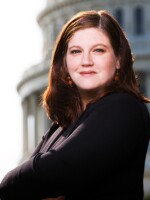These are the final frantic days of the campaign season. From Missouri to Hawaii, New York to California, political groups are jamming in their last attacks. It's a banner year for attack ads -- and the organizations making them -- partly due to the sea of cash unleashed by a Supreme Court decision early this year.
Advocacy groups have popped up all over the country, raising and spending millions of dollars -- without having to name their donors. Never before has so much of the congressional election campaign been waged by groups that operate independently of the parties and candidates.
But in reality, those so-called independent groups may not be so independent after all.
Who Are They?
The groups often bear ambiguous names -- Americans for Job Security, Crossroads Grassroots Policy Strategies, the 60 Plus Association. Many of them live through the generosity of anonymous donors. The ambiguity and anonymity blur the public understanding of who these groups are.
So let's start with who they say they are.
One of the biggest players is American Crossroads, which has run ads like one in upstate New York that says Democrat Scott Murphy "broke our trust."
"Now he wants our vote again? Fool us once, Scott. Shame on you," it says.
Its sister organization, called Crossroads Grassroots Policy Strategies, or Crossroads GPS, describes itself as a "grassroots advocacy organization that is committed to educating, equipping and mobilizing millions of American citizens."
Another group, Americans for Job Security, calls itself "the only independent, bi-partisan, pro-business issue advocacy organization in America." It's running an ad in southwest Virginia that says Democratic Rep. Rick Boucher "has failed to protect our jobs."
"Now it's time Rick Boucher loses his," it adds.
And then there's the 60 Plus Association, which says it's a "non-partisan seniors advocacy group." It has an ad in Pennsylvania that says Rep. Chris Carney, a Democrat, "betrayed us. He supports Pelosi's agenda 91 percent of the time."
With these advertisers and others, the same words come up again and again: Grass-roots. Nonpartisan. Independent.
Their ads seem to imply the groups are homegrown. But every single one mentioned here is based within 20 minutes of Capitol Hill. Most of them, in fact, are in just two office suites.
As for their independence: It would be illegal for them to coordinate their attacks with the candidates they're helping, or with Republican Party committees. But among themselves, they're proud of the way they synchronize their efforts.
"If one group puts an ad on television in a certain congressional district, they let everyone else know that," says Jonathan Collegio with American Crossroads. "This way they don't double up on the advertising."
What They Do
This teamwork didn't happen by accident. But it's hard to grasp just how interconnected these secret donor groups are -- so it may help to take a look at this map.
In addition, here’s an example using someone you've heard of: Karl Rove, President George W. Bush's top political strategist.
Rove co-founded American Crossroads, which later set up Crossroads GPS. Together they've run ads in at least 30 races around the country. They both use the same media services firm to buy airtime for their ads, Crossroads Media, which isn't related to them.
Other clients of Crossroads Media include House Republican leader John Boehner, the Republican National Committee, and the Republican Governors Association, or RGA.
This fall, the RGA received a donation of $3.5 million from Bob Perry. You might recognize that name, since Perry helped to fund the Swift Boat Veterans for Truth ads against presidential candidate John Kerry in 2004.
This fall, Perry made another donation: $7 million to American Crossroads, the group co-founded by Karl Rove.
This clearly isn't a bunch of individual, independent groups -- as you can see from the map. It's one big network: a Republican campaign operation, working outside the official party.
The Other Side
This is not a new strategy. The cash flowed freely -- and often in secret -- two years ago. Except then it was mostly in support of Democrats. Back in 2008, NPR traced one network from its funders, including a union and liberal financier George Soros, to an anti-war coalition and an attack ad against Republican presidential candidate John McCain.
But what Democrats developed, Republicans have mastered.
A big reason why: money. Early this year, the Supreme Court ruled that corporations could spend unlimited amounts of money in partisan politics, and Republican advocacy groups have been flush with cash ever since. At the beginning of October, they had outspent Democratic groups by a 9-1 margin.
Democrats, including President Obama, are trying to make up for it by rallying the liberal base against that corporate money -- but that can backfire, says Collegio of American Crossroads.
"In the eight days following President Obama's remarks, we actually raised more than $13 million," he says.
Where did much of money come from? Well, while American Crossroads has to disclose its donors, Crossroads GPS does not. It's a legal loophole that looms larger this year than ever before, even for those that claim to be grassroots organizations.
And it's enabled Republicans to build a wide and rich campaign network outside their party.
One last example of how just tightly the web is woven: B. Wayne Hughes made a fortune in the self-storage business. He sits on the board of the American Action Network. The way the group is organized, it's unclear how much he's given to it. But he recently gave $1.5 million to American Crossroads, just as the ad campaigns were ramping up.
That group says on its website: "We believe that a new direction for America starts with you -- not with clever political ads, consultants and slick fundraising pitches."
Copyright 2022 NPR. To see more, visit https://www.npr.org. 9(MDAzMjM2NDYzMDEyMzc1Njk5NjAxNzY3OQ001))







